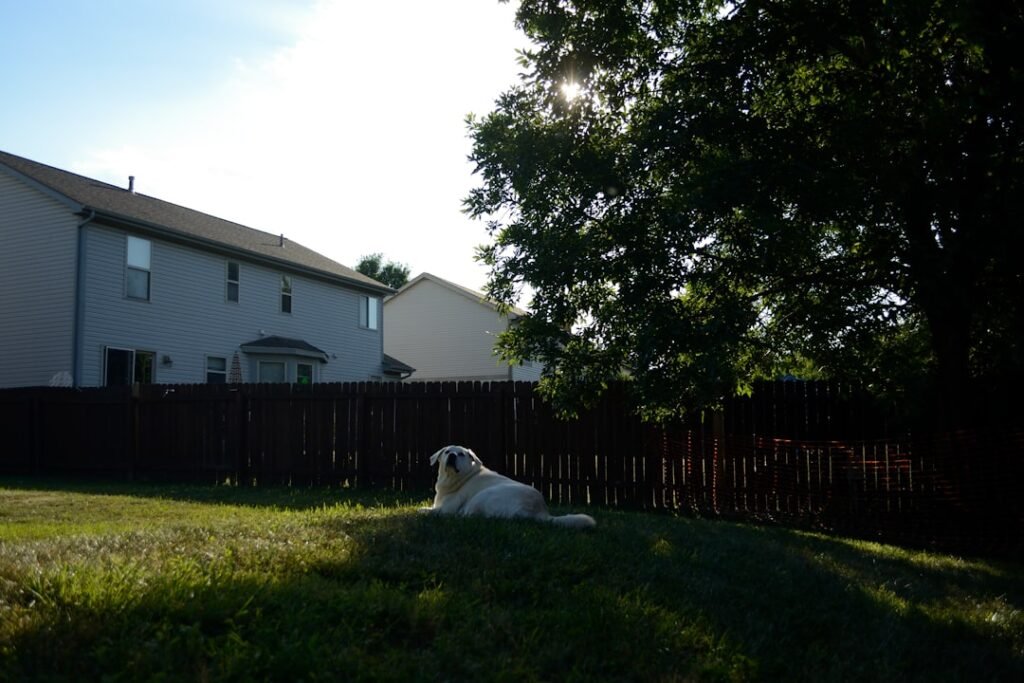The Great Pyrenees, also known as the Pyrenean Mountain Dog, is a large and majestic breed that has a rich history. Originating from the Pyrenees Mountains in France and Spain, these dogs were originally bred to guard livestock and protect them from predators. They have been used for centuries by shepherds in the region and are known for their loyalty, intelligence, and protective nature.
Physically, the Great Pyrenees is a large and powerful dog. They have a thick double coat that is weather-resistant and helps them stay warm in cold climates. Their coat can be solid white or have markings of gray, tan, or badger. They have a strong and muscular build, with a broad head and dark almond-shaped eyes. Their ears are triangular and set high on their head.
In terms of temperament, the Great Pyrenees is known for being calm, gentle, and affectionate. They are highly protective of their family and can be wary of strangers. They are also independent thinkers and may not always obey commands without question. However, with proper training and socialization, they can be well-behaved and obedient pets.
Key Takeaways
- Great Pyrenees are a large breed with a history of guarding livestock in the Pyrenees Mountains.
- Finding a reputable breeder or rescue is important to ensure a healthy and well-adjusted dog.
- Housing and fencing should be secure and safe for a Great Pyrenees, who may have a tendency to roam.
- A balanced diet with appropriate nutrition is important for a Great Pyrenees’ health.
- Regular grooming and coat maintenance is necessary to keep a Great Pyrenees looking and feeling their best.
Choosing the Right Great Pyrenees: Finding a Reputable Breeder or Rescue
When choosing a Great Pyrenees, it is important to find a reputable breeder or rescue organization. This ensures that you are getting a healthy and well-cared-for dog. A reputable breeder will have a good reputation, provide proper care for their dogs, and be knowledgeable about the breed.
When looking for a breeder, ask about health testing that has been done on the parents of the puppies. Great Pyrenees can be prone to certain health issues such as hip dysplasia and bloat, so it is important to ensure that the parents have been screened for these conditions. Additionally, ask about the breeder’s socialization practices and how they raise their puppies.
If you are considering adopting a Great Pyrenees from a rescue organization, ask about the dog’s history and any behavioral or medical issues they may have. It is important to have a clear understanding of what you are getting into before bringing a rescue dog into your home.
Preparing Your Home for a Great Pyrenees: Housing, Fencing, and Safety Considerations
Great Pyrenees are large dogs that require ample space to move around. They are not well-suited for apartment living and do best in homes with large yards or access to open spaces. It is important to provide them with a comfortable and secure living environment.
When it comes to fencing, Great Pyrenees are known for their ability to jump and climb. A sturdy fence that is at least six feet tall is recommended to prevent them from escaping. Additionally, it is important to regularly check the fence for any gaps or weak spots that the dog may be able to exploit.
Safety considerations for Great Pyrenees include providing them with shade and fresh water during hot weather, as they can be prone to heat exhaustion. It is also important to keep them on a leash or in a securely fenced area when outside, as they have a strong prey drive and may chase after small animals.
Feeding Your Great Pyrenees: Nutrition and Dietary Needs
| Feeding Your Great Pyrenees: Nutrition and Dietary Needs | |
|---|---|
| Recommended daily calorie intake: | 1,500-2,000 calories |
| Protein: | 18-22% of daily diet |
| Fat: | 5-8% of daily diet |
| Carbohydrates: | 50-55% of daily diet |
| Calcium: | 1-1.5% of daily diet |
| Phosphorus: | 0.8-1.2% of daily diet |
| Vitamins: | A, D, E, and K |
| Water: | 1 ounce per pound of body weight per day |
| Feeding schedule: | 2-3 meals per day |
| Food allergies: | Common allergens include beef, chicken, dairy, and wheat |
Great Pyrenees are large dogs that require a balanced and nutritious diet to support their growth and overall health. It is important to feed them high-quality dog food that is appropriate for their age, size, and activity level.
In terms of nutritional requirements, Great Pyrenees need a diet that is high in protein and moderate in fat. This helps support their muscle development and provides them with energy. It is also important to provide them with a diet that is low in carbohydrates, as they are prone to weight gain.
Common dietary issues for Great Pyrenees include food allergies and sensitivities. It is important to monitor their diet and watch for any signs of digestive upset or skin issues. If you suspect that your Great Pyrenees has a food allergy, consult with your veterinarian to determine the best course of action.
Grooming Your Great Pyrenees: Coat Care and Maintenance
The Great Pyrenees has a thick double coat that requires regular grooming to keep it clean and healthy. They have a soft undercoat and a longer outer coat that helps protect them from the elements.
Coat care requirements for Great Pyrenees include regular brushing to remove loose hair and prevent matting. They shed heavily twice a year, so during these times, more frequent brushing may be necessary. It is also important to check their ears regularly for any signs of infection and to trim their nails as needed.
Grooming tools and techniques for Great Pyrenees include a slicker brush or comb to remove loose hair and a de-shedding tool to help manage shedding. It is important to be gentle when brushing their coat, as they have sensitive skin.
Common coat issues for Great Pyrenees include matting and tangles. Regular brushing helps prevent these issues, but if they do occur, it may be necessary to carefully remove them with a comb or scissors.
Training Your Great Pyrenees: Basic Commands and Socialization

Training and socialization are important for all dogs, but especially for large breeds like the Great Pyrenees. They are intelligent dogs that respond well to positive reinforcement training methods.
Basic commands to teach Great Pyrenees include sit, stay, come, and down. It is important to start training them from a young age and be consistent with your commands. Use rewards such as treats or praise to reinforce good behavior.
Socialization is also important for Great Pyrenees, as they can be wary of strangers and other animals. Expose them to different people, animals, and environments from a young age to help them become well-rounded and confident dogs.
Exercise and Activity: Keeping Your Great Pyrenees Healthy and Happy
Great Pyrenees are active dogs that require regular exercise to keep them physically and mentally stimulated. They have a moderate energy level and enjoy activities such as walking, hiking, and playing in a securely fenced area.
Exercise requirements for Great Pyrenees include at least 30 minutes to an hour of physical activity each day. This can be broken up into multiple shorter walks or play sessions. It is important to provide them with opportunities to run and explore, as they have a strong instinct to roam.
Activities to keep Great Pyrenees mentally stimulated include puzzle toys, obedience training, and interactive play. They are intelligent dogs that enjoy learning new things and solving problems.
Common exercise-related issues for Great Pyrenees include joint problems and obesity. It is important to monitor their weight and provide them with appropriate exercise to prevent these issues. If you notice any signs of discomfort or difficulty with movement, consult with your veterinarian.
Health Concerns: Common Medical Issues and Preventative Care
Like all breeds, Great Pyrenees are prone to certain health issues that owners should be aware of. Common health issues for Great Pyrenees include hip dysplasia, bloat, and certain types of cancer.
Preventative care measures for Great Pyrenees include regular vet check-ups, vaccinations, and parasite prevention. It is important to keep up with their vaccinations and schedule regular wellness exams to catch any potential health issues early.
Additionally, it is important to monitor their weight and provide them with a balanced diet to prevent obesity. Obesity can put strain on their joints and increase the risk of other health issues.
Great Pyrenees and Children: Tips for Raising a Safe and Happy Family Dog
Great Pyrenees can make wonderful family pets, but it is important to socialize them with children from a young age. They are generally gentle and patient with children, but supervision is always recommended when they are interacting with young kids.
Tips for raising a Great Pyrenees with children include teaching children how to properly interact with the dog, such as not pulling on their ears or tail. It is also important to teach the dog appropriate behavior around children, such as not jumping up or knocking them over.
Common issues to watch out for when raising a Great Pyrenees with children include resource guarding and herding behavior. Great Pyrenees have a strong instinct to protect their family and may become possessive of toys or food. It is important to address these issues early on and seek professional help if needed.
Community Involvement: Participating in Great Pyrenees Clubs and Events
Participating in Great Pyrenees clubs and events can be a great way to connect with other owners and learn more about the breed. These clubs often offer activities such as conformation shows, obedience trials, and herding trials.
Benefits of participating in Great Pyrenees clubs and events include the opportunity to meet other owners who share your love for the breed. It can also provide you with resources and support for training and care.
To get involved in the Great Pyrenees community, start by researching local clubs or organizations in your area. Attend events or meetings to meet other owners and learn more about the breed. You can also join online forums or social media groups dedicated to Great Pyrenees to connect with other owners virtually.


